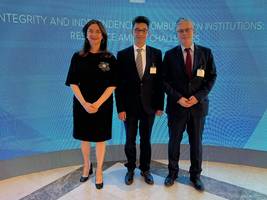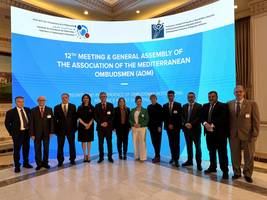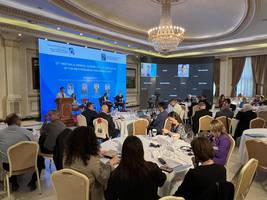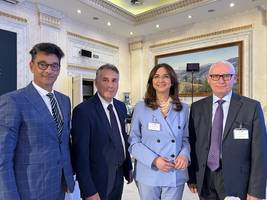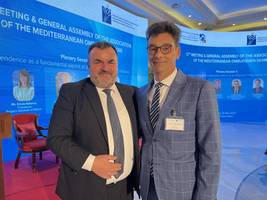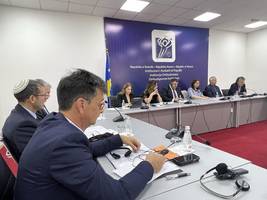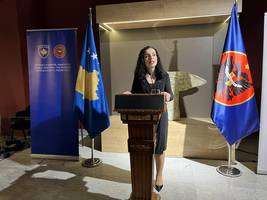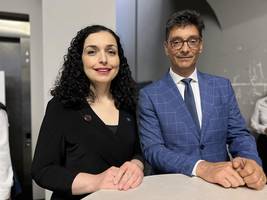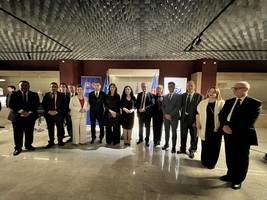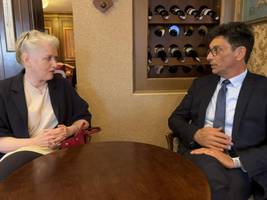At the invitation of the Kosovo Ombudsman Naim Qelaj, the Human Rights Ombudsman Peter Svetina is participating at the meeting of the Association of Mediterranean Ombudsmen (AOM) in Priština, Kosovo. This year, the main topics are the significance of integrity and the independence of national institutions for human rights. Meetings of the Governing Board and the Association’s General Assembly are being held in parallel with the AOM meeting; the latter also discussed and, with unanimous agreement, supported the proposal of the AOM President Dr Andreas Pottakis to appoint Ombudsman Svetina, who was previously a member of the Governing Board, to the position of Vice-President of the AOM. The organisation brings together more than 30 countries in the region with various competences in relation to authority bodies, yet with a common goal – to effectively protect and promote human rights in the Mediterranean, while actively cooperating and exchanging experience.
Upon his election as AOM Vice-President, Ombudsman Svetina thanked his colleagues for their trust. “This is a great honour and acknowledgement for the work done to date and the engagement not only with me but the entire team of the Slovenian Human Rights Ombudsman, which is a valued partner and a sought-after collocutor in the international environment. Initiatives of foreign partners for our wider engagement internationally, where we not only present our work but are also in the spotlight as an example of best practice, indicate that we do good work,” believes Svetina. As he said, in his role as AOM Vice-President he will strive for the strengthening of cooperation not only with the Association’s member states but also other regional and states mechanisms for human rights. He stressed that he will continue to place at the core of his work the importance of the rule of law, which due to wars, political, and social events in the EU and further afield, unfortunately slides steeply down in terms of civilisation. “In many places in the region and beyond, numerous democratic gains have been greatly tested, therefore it is especially important that we strengthen its immune system in society – independent supervisory institutions, free and independent media, an autonomous academic world, civil society, and other active members of society. “A healthy society functions based on the rule of law, socially agreed rules are abided by, relations of power, too, the power of argument, respectful dialogue, solidarity, and community opinion are gambled on, while democratic standards which were difficult to achieve are not only a dead letter on paper,” adds Peter Svetina.
As many times before, he advocated once again at the meeting in Priština for the strengthening of the operation and financial autonomy of independent institutions and criticised all political attempts to potentially dissolve their jurisdiction. According to him, independent institutions have been founded with the purpose of ensuring fundamental values, which includes taking care for the respect of human rights and fundamental freedoms. Svetina hence also believes that we need to stand decisively against any attempts to demolish the democratic level which hinder the effective execution of jurisdiction for independent institutions and shake their reputation built over many years. On behalf of Slovenia Svetina supported the adoption of the Special Declaration ("AOM Pristina Declaration"), by which the AOM calls, among other things, for states and governments to guarantee and strengthen the independence of the Ombudsman institutions.
Svetina also presented to the participants the Slovenian case, in which the Constitution of the Republic of Slovenia does guarantee to the institution of the Human Rights Ombudsman of the Republic of Slovenia an independent and autonomous position, one of the features of which is budgetary independence, but the legislation enables the Government of the Republic of Slovenia to demand harmonisation of proposals for financial plans, which can result in yielding to the will of the current executive authority. “Despite the fact that in 2020 the Constitutional Court of the Republic of Slovenia (with decision no. U-I-474/18-17) in this case determined unconstitutionality and judged that the legislature must abolish it within one year, this has not happened to this day; therefore, in the current Annual Report the Slovenian Ombudsman repeats the recommendation connected to the provision of independence,” emphasised Ombudsman Svetina at the meeting. He also recalled that third annual report of the European Commission on the state of the rule of law for 2022, in which the European Commission also recommends legislative change towards strengthening the operation and providing financial autonomy of the Ombudsman, for which other national institutions for human rights also strive.
During the debate about integrity and the meaning of early discovery of bad practices Ombudsman Svetina emphasised that more efforts should be directed towards raising awareness or educating and training in this field, since wider awareness of the significance of ethics, morals, and integrity is crucial in practice. “Only thus will we be able to steer back to being the society of knowledge, ethics, and values which we, I hope, all want,” he added.
On the margins of the meeting, the President of the Republic of Kosovo Dr Vjosa Osmani-Sadriu hosted the reception for the members of the Association of the Mediterranean Ombudsmen. In a conversation, the Ombudsman Svetina congratulated her on the recent 15th anniversary of independence, which was commemorated by the Republic of Kosovo in February 2023 and expressed his desire to continue friendly relations between the two countries. Svetina also held other bilateral meetings in Kosovo, including with several Ombudsmen and the Ambassador of the Republic of Slovenia to the Republic of Kosovo Minca Benedejčič.
Ombudsman Svetina elected Vice-President at the meeting of the Association of Mediterranean Ombudsmen
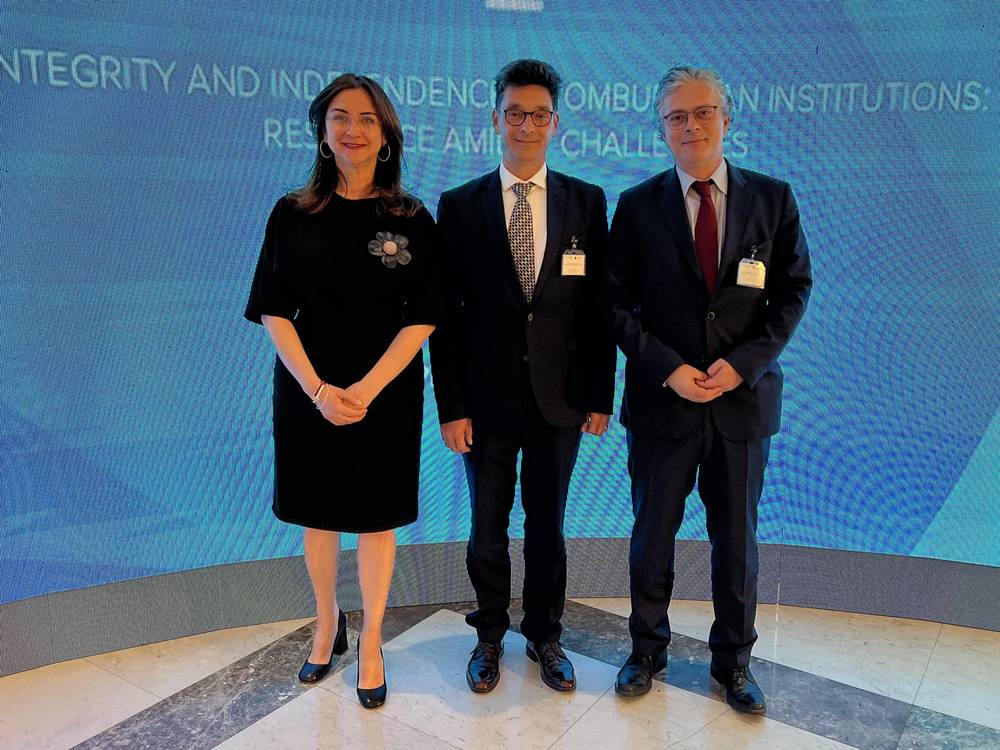
Foto galerija
(10)
From left to right: Albanian Ombudsman Erinda Ballanca, Ombudsman Peter Svetina and Greek Ombudsman Andreas Pottakis
Ombudsman Peter Svetina with his Albanian colleague Errinda Ballanca and his Maltese colleague Joseph Zammit McKeon and the director of the Maltese institution of the ombudsman Paul Borg
